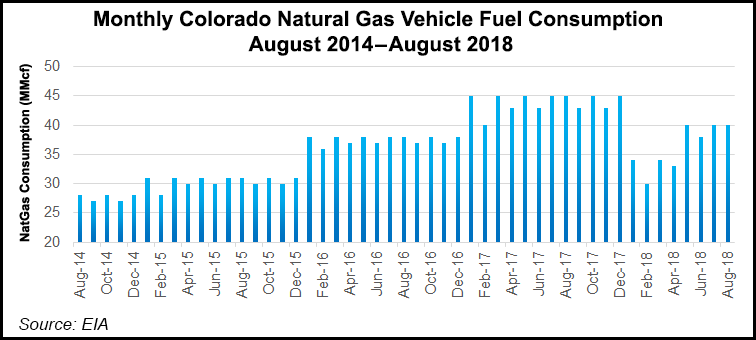Regulatory | Infrastructure | NGI All News Access | NGI The Weekly Gas Market Report
As Colorado Adopts Clean Car Standards, Trade Groups Ask for NGV Incentives
Colorado has reportedly become the 13th state to adopt clean car standards, shortly after several natural gas trade associations asked federal regulators to expand incentives for natural gas vehicles (NGVs), specifically cars and light trucks.

Last Friday, the Colorado Air Quality Control Commission unanimously set state standards for motor vehicles, requiring less pollutants and more fuel economy. A baker’s dozen of states have now enacted such standards, according to the Environmental Defense Fund (EDF), which hailed the state’s effort.
“The new state clean car standards will protect Coloradans’ health and the state’s natural beauty, and will save people’s hard-earned money,” said EDF President Fred Krupp. “The Trump administration has been undermining our most important health and environmental protections, but states like Colorado are stepping up with win-win solutions.”
Outgoing Gov. John Hickenlooper and Gov.-elect Jared Polis, both Democrats, support the clean car standards. Hickenlooper issued an executive order to provide state health and environmental policymakers with the framework for adopting the standards earlier this year.
Colorado expects the new standards to reduce climate pollution by more than 2 million metric tons/year (mmty) in 2030 and by 4.5 mmty in 2040, while reducing the types of air pollution tied to heart and lung disorders. The state also expects fuel standards under the program will save the average Colorado new car owner about $2,400 over a six-year period.
Earlier this month, the Washington, DC-based trade group Natural Gas Vehicles for America (NGVAamerica) and several other gas groups submitted comments to the National Highway Traffic Safety Administration (NHTSA) and the Environmental Protection Agency (EPA) related to proposed rules for “safer affordable fuel-efficient (SAFE) vehicles” covering future model years 2021-26 for cars and light-duty trucks.
The trade groups asked NHTSA and EPA to use their rulemaking to expand incentives for NGVs in the light-duty sector, particularly pickup trucks, work vans and sport utility vehicles. NGVAmerica, the Coalition for Renewable Natural Gas, American Gas Association, and American Public Gas Association all signed on to the recommendation.
As support for the recommendations about NGVs, the groups touted gas transportation alternatives for providing emission reductions, road-tested commercial availability, savings and “environmental and climate benefits without sacrificing safety.”
In California, the state energy commission approved an $8 million grant for a high-capacity hydrogen fuel cell station at the Port of Long Beach. It is expected to help implement the port’s expansion of zero-emission fuel cell electric Class 8 drayage trucks, transporting freight from the harbor to warehouses.
Pushing the fuel cell vehicles in the port is aimed at replacing the use of older vehicles with no emission controls. Promoting the use of zero-emission vehicles will help reduce greenhouse gas emissions in the nation’s second-busiest container port, and the station is to source hydrogen from 100% renewable biogas.
© 2024 Natural Gas Intelligence. All rights reserved.
ISSN © 1532-1231 | ISSN © 2577-9877 | ISSN © 1532-1266 |
